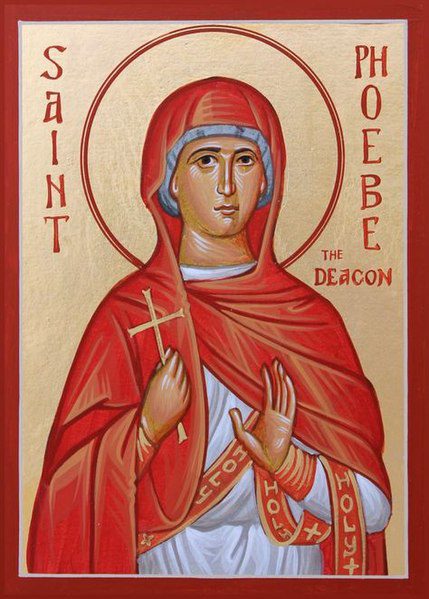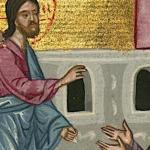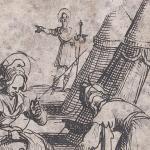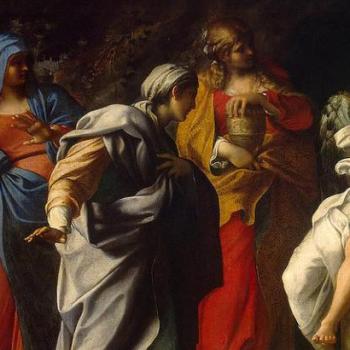Phoebe: Sister, Deacon, Saint, Spiritual Mentor, and Commentator
By Timothy Paul Erdel
Read Romans 16:1–2
(Originally titled “Phoebe: Four Titles and a Task”)
I don’t know how much you think about titles. During this Olympics we may hear phrases such as “Olympic Champion” or “The World’s Fastest” or “The World’s Greatest.”
The Middle Ages was fascinated by aristocratic titles, and C. S. Lewis had some fun with that when he wrote The Chronicles of Narnia. Remember Peter’s challenge to cruel King Miraz in Prince Caspian? Peter begins his letter, which Lewis fills with marvelously comical pastiche, with these sonorous titles.
Peter, by the gift of Aslan, by election, by prescription, and by conquest, High King over all Kings in Narnia, Emperor of the Lone Islands and Lord of Cair Paravel, Knight of the Most Noble Order of the Lion, to Miraz, Son of Caspian the Eighth, sometime Lord Protector of Narnia and now styling himself King of Narnia, Greeting.
Universities, for all their purported progressiveness, are essentially a Medieval idea, and universities are often filled with people who care far too much about titles. I know a faculty member rather well who teaches at a nearby university and who has collected over two dozen titles at the different schools he has attended and worked for professionally. Some of them might sound impressive, at first. Beware the person who takes such titles too seriously!
There are titles we should take seriously. A nurse or a medical doctor is worthy of respect, especially during these days, when they are serving on the frontlines of a pandemic. These are hard times for teachers too, and we would do well to honor them, as well as social workers and therapists.
Some of the hardest titles to live up to are ones we may all too often take for granted, including mother, father, son, daughter, sister, brother, husband, wife, and neighbor. We need to think carefully about such titles and what they might mean.
There are other important titles. Pastors Carrie and Dave have unique roles of ministry and service. The title Pastor reminds us of their roles as shepherds, leading and guarding this flock. In fact, there is a sense in which we should revere ministers. That is why, in some Christian traditions, ordained ministers are called Reverend.

We meet Phoebe in the last chapter of the famous letter the Apostle Paul—notice his title: the Apostle Paul—wrote to the Christian believers in Rome. In one sense, we know little more about Phoebe than she had four titles and a task. But if we explore the meaning of those four titles and the nature of her task, then we are struck by what a special person Phoebe was.
Sister
The Apostle Paul begins by calling Phoebe “our sister,” a term of spiritual kinship, intimacy, and respect. Paul called Timothy his son in the faith, but he calls Phoebe his sister. The term emphasizes the parity in their relationship. The Apostle does not claim any authority over her, as he does when writing to the Corinthians, nor point out any spiritual debt that she might owe to him, as he reminds Philemon. In fact, the Apostle Paul is quick to acknowledge his debt to Phoebe, as he does to the Philippians.
Phoebe is a sister by Creation, and more importantly, by Redemption, both to Paul and to the Roman recipients of the letter. The writer of the letter to the Hebrews (2:11), even reminds us that Jesus Christ is her brother, as Jesus is to every person he has sanctified; so, Phoebe is the sister of Jesus too.
Deacon
The second title Phoebe had was that of a Deacon, not deaconess, as some translations would have it. She was a Deacon in the Church at Cenchrea. Different Christian traditions might mean different things when they appoint or ordain someone a Deacon. It is important, therefore, to remember the first century setting and who the first Deacons were in the book of Acts.
There were complaints in Acts 6 because the Greek Jewish widows were not being treated as well as the Hebraic Jewish widows. The Apostles, apparently forgetting the example of the Lord Jesus Christ, who had washed their feet as his culminating act of ministry, just before he was crucified, thought that being an Apostle meant they should only teach Scripture, pray, and do obviously “spiritual” tasks. So, the Apostles appointed Deacons to do the Church’s service work, the hands-on ministry, such as distributing food to needy people.
God has a marvelous sense of humor, however. The Apostles had been the primary vehicles for the work of the Holy Spirit until that point in Acts; but, once the Deacons were appointed, the Holy Spirit suddenly began doing all sorts of miracles and spectacular signs through them. One Deacon, Stephen, who was a powerful preacher, became the first Christian martyr. Further persecution followed, and the Gospel message spread beyond Jerusalem and Judea to Samaria under Philip’s dynamic ministry. Philip, another of the first seven Deacons, was then directed by an angel to meet an influential Ethiopian, the treasurer to Queen Candace, to teach him and to baptize him. That was probably the beginning of the great Ethiopian Coptic Church, which exists to this day; and the Ethiopian eunuch Philip baptized may have been the first Black African Christian convert. So, a Deacon helped take the Gospel beyond Jerusalem and Judea on to Samaria and the ends of the earth. Philip’s evangelistic ministry was enhanced by his four daughters, who each prophesied.
So, when Phoebe was called a Deacon, it was a noble title. Yes, Phoebe was a servant, like Jesus Christ, who humbly undertook any task. Nothing was beneath her. But she was also the immediate heir of a powerful spiritual tradition of preaching, teaching, miracle-working, and transformation, of martyrdom, of taking the Gospel of Jesus Christ to a despised ethnic group next door as well as on to the ends of the known world, while simultaneously opening the door to women who ministered prophetically.
Saint
Phoebe carries a third title. She is a saint, a holy one made pure by the work of Jesus Christ on the Cross and by the regenerating work of the Holy Spirit in her life. She is not alone in this, because she is among the saints, a term the New Living Translation renders with the phrase, God’s people. She appears in that marvelous circle of persons truly made right with God. Yes, the New Testament teaches that all genuine believers are saints, contrary to some liturgical traditions, which have protracted processes by which someone is declared a saint. But it is still no small thing to be numbered among the saints by the Apostle Paul.
Spiritual Mentor
The fourth title may be the most interesting of them all.
When the Apostle Paul refers to Phoebe, he says she has been a great help to many people, including himself. Such an English translation smooths over a startling title in the Greek. The Apostle Paul is calling Phoebe a Benefactor or a Patron, but those words are too tame in English. In Spanish, we would say Patron. In the Mafia, or in one of the two dozen or so tough neighborhoods in Kingston, Jamaica, areas ruled by gangs, people would call such a person a Don. In the secular world, a Patron or a Don is the dominant person whom other people come to for all kinds of help, protection, and advice. In short, Dons are recognized for their strong leadership and their ability to intervene. In ancient Rome, a Patron had the court-appointed authority both to lead and to act as legal agents on behalf of others. At one point, it was assumed that only men could have that much authority; but scholars have now found instances of Roman women with that august legal title and power.
Bethel University literature professor Robby Prenkert did two years of basketball ministry in Tower Hill, Kingston, Jamaica, one of Kingston’s many tough neighborhoods. Robby was even a professional member of the JBA, the Jamaica Basketball Association. But his white skin, American citizenship, and basketball prowess did not guarantee his safety. Intermittent gang violence erupted there and in nearby neighborhoods. One night, a man from a rival territory was murdered on the court where Robby and the Tower Hill Thunder played. But, in all the time Robby was in Kingston, no one ever threatened him. Robby never met the local Don who ruled over Tower Hill; but Robby knew that unless the Don had given the word not to touch him, his life could have been in danger and his ministry cut short.
Now, I don’t think Phoebe was that kind of Don, that kind of Patron. She wasn’t a powerful thug or gang leader. But I do think Phoebe was a powerful Patron in another way. She was a spiritual Patron. We might call someone like her a Spiritual Mentor, or in some traditions, a Spiritual Director. And she had mentored many people, including the great Apostle Paul. You may not believe this, but that is my conclusion about what this passage teaches us. Phoebe was a Spiritual Mentor to the Apostle Paul. Think about that.
Commentator
So, the Apostle Paul recognized Phoebe had four titles. She was a beloved spiritual Sister to the Apostle Paul. She was a Deacon in an era when Deacons were people the Holy Spirit used in powerful ways. She was a Saint, a person made spotless by God, one who lived a holy life. And Phoebe was a Spiritual Mentor to many people, including the Apostle Paul. She might have given many people, including Paul, material support. Dons or Patrons often do dispense large sums of cash. But they are primarily known for their authority, advice, and leadership, which frequently take the form of strict orders that require obedience. In Phoebe’s case, she would have given spiritual direction to those in need, including the Apostle Paul.
No wonder the Apostle Paul told the Romans that Phoebe was worthy of special honor wherever she went among God’s people.
N. T. Wright is among those scholars who suggests that Phoebe also had a special task, and I think he is right. Phoebe is commended by the Apostle Paul to the Romans, who are to receive her. Why is Paul sending Phoebe to Rome? Presumably it is to carry his letter to the Roman Christians.
The next step involves a bit of speculation, but the most obvious reason Phoebe is commended to the Romans is that, as the courier, she would be expected to read aloud, explain, and answer questions about the letter Paul wrote to them. The Apostle Paul wants the Romans to know Phoebe is worthy and able to carry out her task. So, the original commentary on what we would today call the Book of Romans, which has been a centerpiece of Christian theology since the first century, was by Phoebe, Sister, Deacon, Saint, and Spiritual Mentor.
Honoring Phoebe
All summer long, we have been hearing about amazing women, women whose stories have been at the core of the most important book in human history, even if their stories are too often passed over, just because they are women.
Ralph Ellison wrote a great novel, Invisible Man, about the way Whites stereotype Blacks, so that the real Black person becomes invisible, lost in the stereotypes. Women may become invisible too, lost in our stereotypes of them.
Phoebe is one of many women in the Bible who should become more visible to us, who should break our stereotypes about women. Phoebe had four remarkable titles, two that we often link with men, Deacon and Patron, or Spiritual Mentor. She was even a Spiritual Mentor to the great Apostle Paul. And the Apostle Paul charged Phoebe with an incredible task. Phoebe would hand deliver, read, and explain what many theologians down through the ages have thought is the greatest theological treatise ever written.
There have been many Olympic Champions. There have been many kings. There have almost certainly been way too many professors overly concerned with long and fancy titles. But then there is Phoebe, with four remarkable titles and one incredible task.
May Phoebe be a role model and an inspiration to us. We would do well to learn from her life and example.
Because we can be a sister or a brother to our sisters and brothers, if we have open, willing hearts.
Because we can serve others and minister to them in the fullness of the Holy Spirit, if we have open, willing hearts.
Because we can live pure, holy lives devoted to God, if we have open, willing hearts.
Because we can give spiritual direction to those in need around us, if we have open, willing hearts.
May we be more like Phoebe—Sister, Deacon, Saint, and Spiritual Mentor, as well as the first reader and explicator of Romans—who was worthy of honor as she moved among God’s people.













